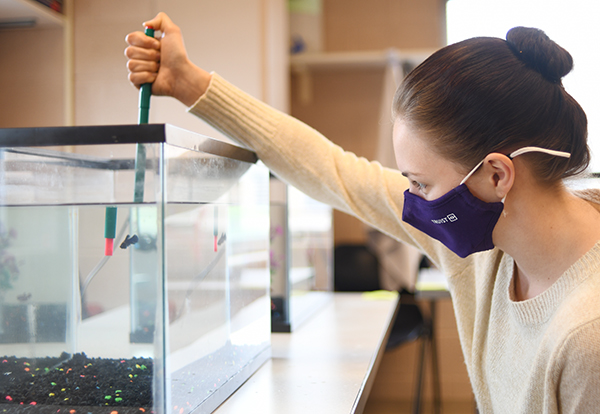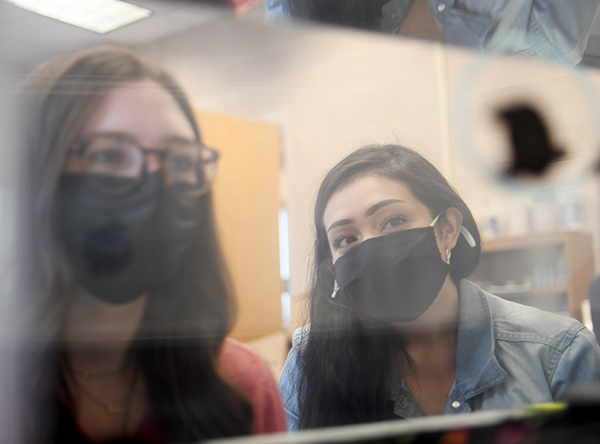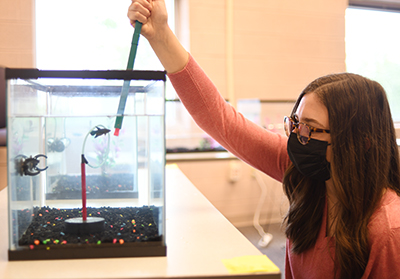News
Teaching Fish to Limbo: Recent Graduate Led Betta Fish Research
05/18/21
 In some labs, you dissect frogs.
In some labs, you dissect frogs.
In others, you teach fish to limbo. Or even, play soccer.
An average lab day in Dr. Elizabeth Dunaway’s psychology course in learning and behavior at Dalton State last semester meant training betta fish to do tricks, such as the limbo, swimming through hoops or pushing a small ball into a net.
The lab was designed by then student Morgan Robinson, who graduated last week from Dalton State with a bachelor’s degree in psychology. Robinson was able to participate in an undergraduate research project before the pandemic began in 2020 where she applied psychology theories she learned in classes to training the betta fish.
Because of her work in undergraduate research, she was able to create a lab for a full class of students. She was Dunaway’s lecture assistant, helping students apply course concepts to hands-on experience as they taught fish to do tricks.
“It’s easier to understand what Dr. Dunaway has been teaching in class when we’re able to do it ourselves,” said Rosa Perez, who also graduated last week with a psychology degree. “It’s great getting hands-on experience with research, especially since we lost a lot of research opportunities because of COVID-19. The fish lab gave us the experience we missed out on.”
The fish training involves psychological principles of conditioning made famous by Ivan Pavlov’s salivating dogs and B.F. Skinner’s work training animals by using food to reinforce behavior.
 “Operant conditioning essentially involves three things: an antecedent, a behavior, and a consequence,” Dunaway said. “An antecedent is a set of conditions that signal to the organism that if a certain behavior is performed under those conditions, a consequence will occur. To train the fish, we reward them with food upon successful completion of the task, which positively reinforces the behavior and increases the target behavior.”
“Operant conditioning essentially involves three things: an antecedent, a behavior, and a consequence,” Dunaway said. “An antecedent is a set of conditions that signal to the organism that if a certain behavior is performed under those conditions, a consequence will occur. To train the fish, we reward them with food upon successful completion of the task, which positively reinforces the behavior and increases the target behavior.”
In the spring of 2020, Robinson worked with another student, Chris Muno, to put the theories to the test using betta fish as subjects. Together, they successfully trained three betta fish to perform various tasks before their efforts were cut short by the pandemic. The research laid the groundwork for the lab.
“Learning and behavior was really interesting to me,” Robinson said. “It really clicked. I understood all the concepts, and I wanted to see more of them.”
Due to the pandemic, class sessions and lab days were divided into cohorts so that Dunaway lectured half of the students in the classroom while Robinson led the other half in the fish lab. In the lab, students worked in pairs to train the fish using the methodology Robinson helped develop. Each group was assigned a fish and, over several weeks, conditioned the fish to perform tasks, marking its progress along the way.
“The goal of the research was to get students working hands-on with conditioning to improve their learning experience,” Robinson said.
For the students involved, the lab experience also helps open the door to careers in research and psychology.
“In terms of graduate school and careers in psychology, having lab experience is almost a necessity, and being able to work with animals, in particular, is a very marketable skill,” Dunaway said.
 For Robinson, the experience has reinforced her passion for behavioral psychology and helped prepare her for the next step.
For Robinson, the experience has reinforced her passion for behavioral psychology and helped prepare her for the next step.
“This has been my major research experience at Dalton State,” Robinson said. “It’s been a unique opportunity that will help me in applying to graduate school. Eventually, I’d like to become a professor and be able to do stuff like this all the time.”
Dunaway plans to keep the fish lab as an integral part of the learning and behavior course for the foreseeable future and plans on expanding it to include mice as well.
“When we first started, I had no idea how far we would take this,” Robinson said. “But it branched out and kept getting bigger, and now we’re here.”
